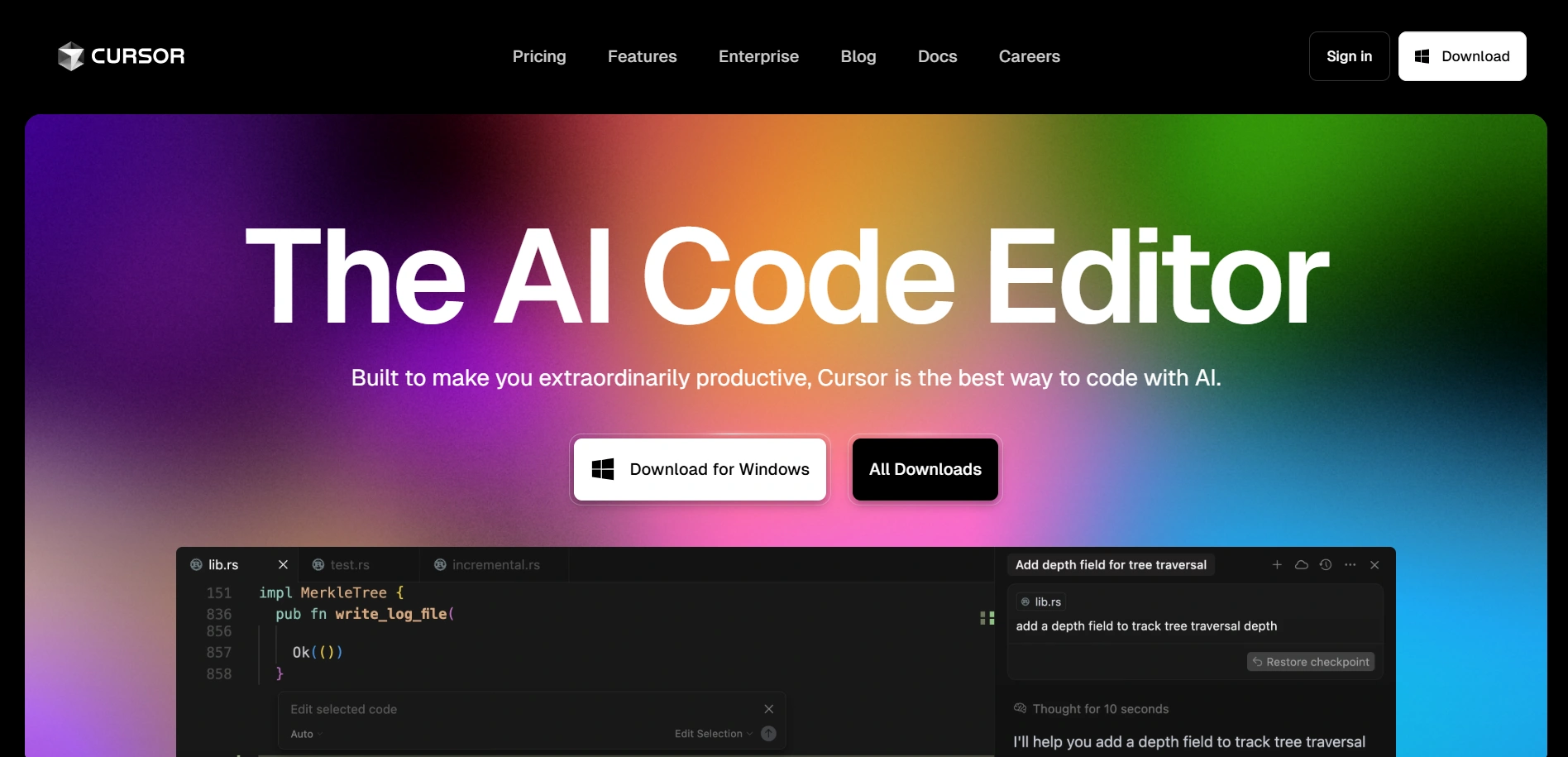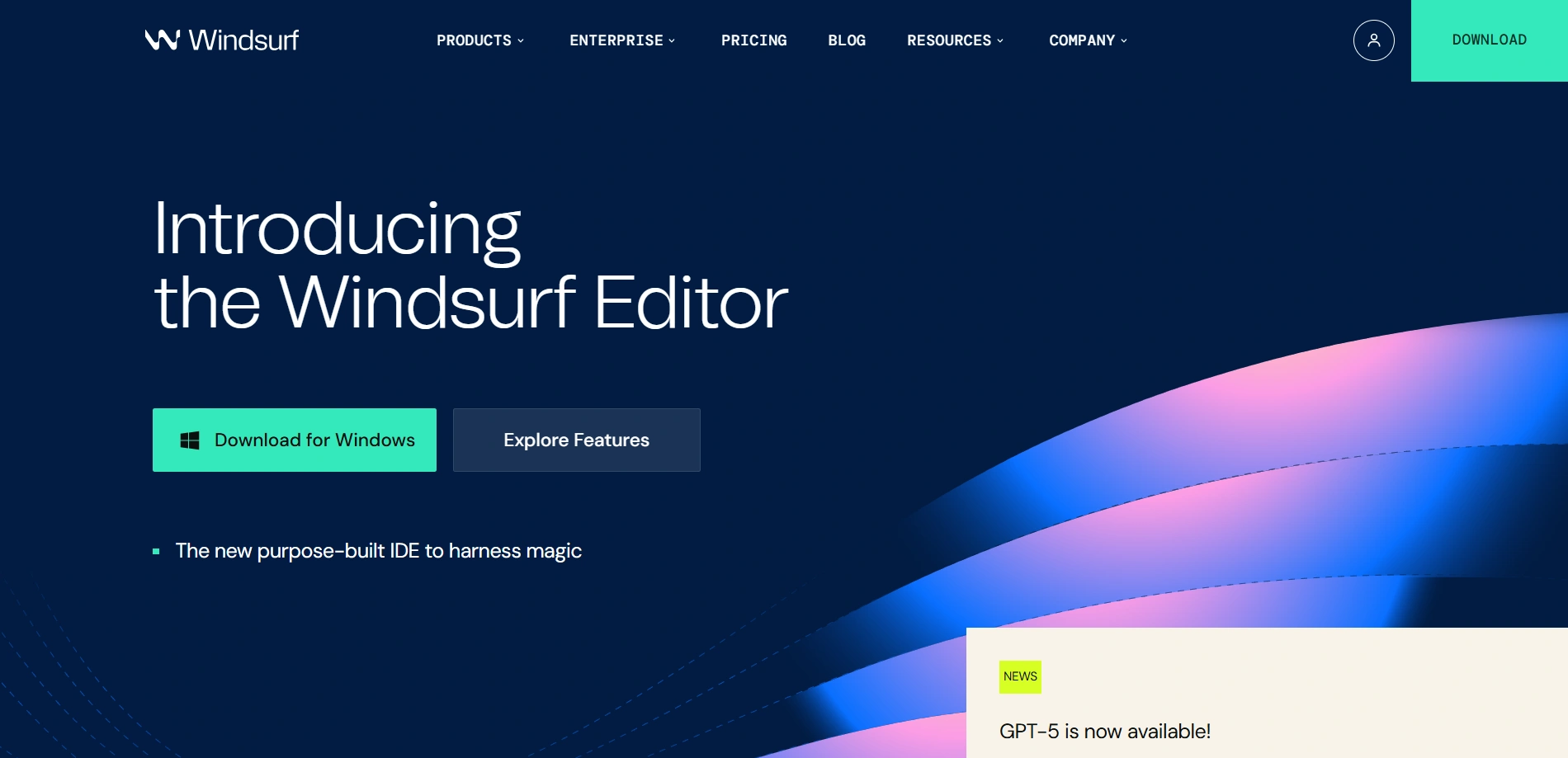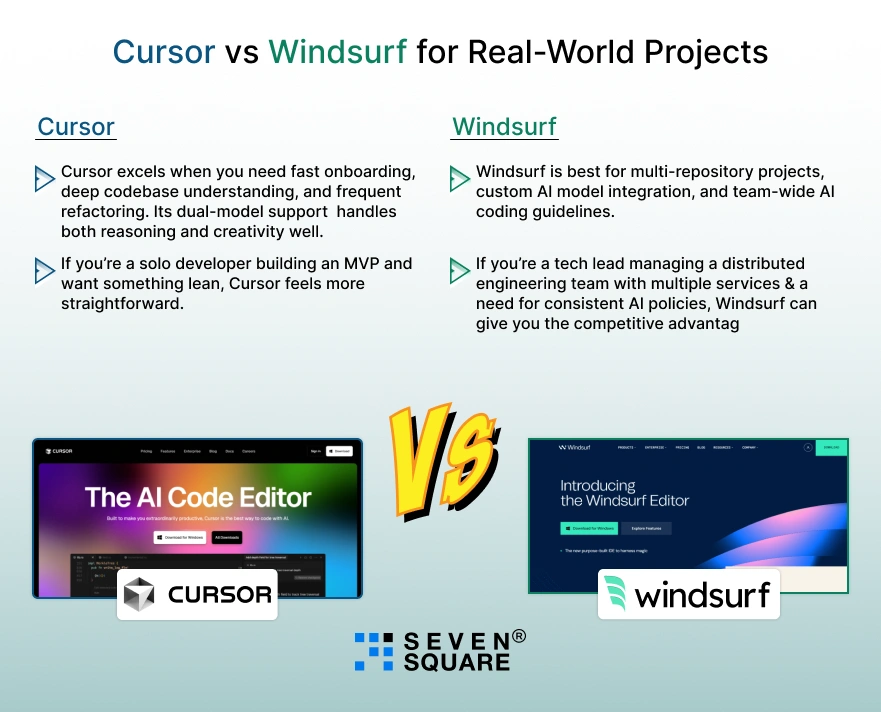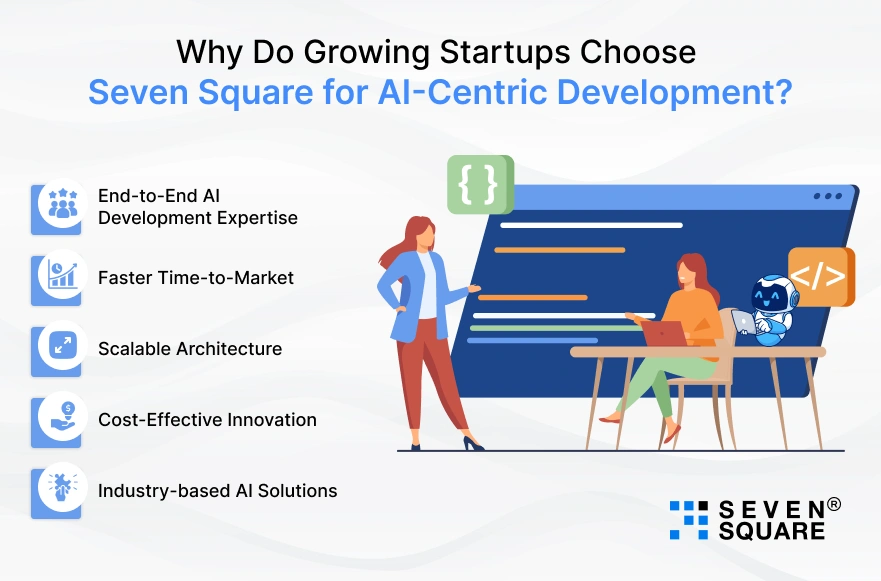It’s late Friday evening. Your sprint deadline is on Monday.
The bug backlog keeps growing, and your feature release is hanging by a thread.
You’re scrolling through dev forums, looking for ways to write, debug, and deploy faster without sacrificing quality.
That’s when two names keep coming: Windsurf and Cursor.
Both promise lightning-fast coding, AI-powered assistance, and smooth workflows.
But which one delivers better results? Which AI coding tool saves your time, keeps your code clean, and boosts productivity without a steep learning curve?
Having worked with AI development tools across fintech, SaaS, healthtech, and eCommerce projects, we’ve seen firsthand how the right coding companion can make the difference between missing a release and shipping ahead of schedule.
In this blog, we’ll break down Windsurf vs Cursor, feature by feature, speed by speed, so you’ll know exactly which tool is perfect for your workflow.
What is Cursor?

Cursor is an AI-based coding IDE designed for modern development workflows.
Built on GPT-4, Claude 3.5, and other cutting-edge LLMs, Cursor does more than suggest code as it reads, understands, and works with your entire codebase.
Instead of tossing one-line suggestions, Cursor can:
- Refactor multiple files in a single command.
- Maintain context across services and modules.
- Let you chat directly with your codebase for instant explanations or changes.
At Seven Square, our developers use Cursor when:
- Working on enterprise-grade backend systems.
- Integrating complex APIs or ERP platforms.
- Scaling multi-tenant SaaS architectures where cross-file logic is key.
If you’re looking for AI based development that’s more context-aware, then Cursor is a serious contender, especially for large, modular, or API-heavy projects.
What is Windsurf?

Windsurf is the newest AI-first IDE making waves in the developer community.
It combines intelligent autocompletion, natural language prompts, and full-project understanding into a single, lightning-fast workspace.
Where it excels:
- Real-time AI code generation that’s faster than traditional IDE-based assistants.
- Deep integration with Git workflows for smooth commits, reviews, and merges.
- Context-aware suggestions that adapt as you refactor or restructure your project.
At Seven Square, we’ve found Windsurf ideal for:
- Frontend-heavy SaaS products with evolving UI/UX needs.
- MVP and prototype builds where speed is critical.
- Teams that want Copilot-level convenience with a more agile, project-wide brain.
If your goal is to ship features faster, reduce repetitive coding, and keep your entire codebase in AI’s memory, Windsurf is perfect for you.
Cursor vs Windsurf: Feature-by-Feature Comparison for Developers
Before we break down Cursor vs Windsurf, remember this key difference: Cursor is an AI-based code editor, while Windsurf is an AI-based IDE built on top of VS Code principles with deeper workflow automation.
This Windsurf vs Cursor Comparison will resolve all your doubts:
| Feature | Cursor (GPT-4 + Claude) | Windsurf (Claude + Custom AI) |
|---|---|---|
| Code Completion | Yes (GPT-4 + Claude) | Yes (Claude 3.5) |
| AI Code Search | Yes | Yes (with project-wide indexing) |
| Chat with Entire Codebase | Yes | Yes (multi-repo support) |
| Inline Suggestions | Yes | Yes |
| Multi-line Code Generation | Yes | Yes |
| Code Explanation | Yes | Yes (more human-like summaries) |
| Refactoring Support | Strong | Strong |
| Supports VS Code Extensions | Yes | Yes |
| Enterprise Access | Early-stage | Growing (enterprise-ready) |
| Offline Mode | Limited | Planned |
| Custom AI Models | No | Yes (self-hosted options) |
Cursor vs Windsurf for Real-World Projects

We’ve tested both tools in production-grade SaaS, healthtech, and fintech projects.
- Cursor excels when you need fast onboarding, deep codebase understanding, and frequent refactoring. Its dual-model support (GPT-4 + Claude) handles both reasoning and creativity well.
- Windsurf is best for multi-repository projects, custom AI model integration, and team-wide AI coding guidelines.
If you’re a solo developer building an MVP and want something lean, Cursor feels more straightforward.
If you’re a tech lead managing a distributed engineering team with multiple services & a need for consistent AI policies, Windsurf can give you the competitive advantage.
Explore the difference between Cursor vs Copilot.
Cursor vs Windsurf: Pricing & ROI Considerations
Most founders worry about the monthly cost, but forget about total development ROI.
Choosing the wrong AI coding tool can lead to:
- Higher refactoring costs.
- Slower onboarding for new developers.
- Messy code that’s harder to maintain.
| Tool | Cost/Month | Best For |
|---|---|---|
| Cursor Pro | $20 | Teams that want speed + code clarity. |
| Windsurf Pro | $25 | Scaling teams with AI model customization needs. |
When our Seven Square clients need faster product delivery without compromising maintainability, we often evaluate Cursor vs Windsurf side-by-side.
- For fast-moving startups, Cursor’s simplicity wins.
- For enterprise-grade projects, Windsurf’s custom AI policies + deep search often outweigh the slightly higher price tag.
Cursor vs Windsurf: Key Differences That Impact Your Workflow
At Seven Square, we’ve tested Cursor AI and Windsurf on everything from SaaS MVP builds to multi-repo enterprise applications in fintech, logistics, & healthtech.
Here’s what we’ve learned about their real-world features, advantages, and trade-offs.
1. Cursor AI: The Context-Aware Coding Powerhouse
Cursor is a full AI-native IDE designed for developers who work in large, context-heavy codebases.
Where Cursor outperforms:
- AI-powered search + codebase awareness: Cursor can “read” and understand your entire project, not just the file you’re editing.
- Chat directly with your code: Ask it why a class exists, what a function does, or the safest way to refactor logic.
- Smarter multi-file refactoring: Change patterns, variable names, or logic across multiple files at once.
- VS Code compatibility: Built on VS Code foundations, so most familiar shortcuts and extensions still work.
Downsides: It’s still a younger product compared to traditional IDEs, so while most extensions work, you may not find every plugin or UI theme you’re used to.
Best for: Teams managing complex architectures, large legacy systems, or multiple microservices where code understanding is as important as code writing speed.
2. Windsurf: AI-Assisted IDE for Multi-Repo & Team-Wide Efficiency
Windsurf takes the VS Code experience and layers on powerful AI-first workflows, but with a particular focus on team productivity and scalability.
Where Windsurf is useful:
- Multi-repository AI search: Query across several linked projects without leaving the editor.
- Custom AI model support: Integrate your own AI models for privacy, compliance, or specialized training.
- Team-wide AI coding policies: Enforce consistent code style and rules across all contributors.
- Human-like code explanations: Faster onboarding for new hires without long code review meetings.
Where it falls short: Windsurf is slightly pricier than Cursor, and its interface, while familiar, can feel heavier for solo developers who just want fast code completion.
Best for: Distributed engineering teams, enterprises with compliance needs, and companies juggling multiple interdependent repositories.
Why Do Growing Startups Choose Seven Square for AI-Centric Development?

We partner with startups and scale-ups to deliver AI solutions that turn innovative ideas into market-ready products.
Here’s why founders and product managers trust Seven Square for AI-based success:
- End-to-End AI Development Expertise: From machine learning model integration to AI-based user experiences, we handle everything under one roof.
- Faster Time-to-Market: Our agile, AI-first workflows help startups launch MVPs and iterate quickly, staying ahead of competitors.
- Scalable Architecture: We design AI solutions that grow with your business, ensuring future-proof scalability.
- Cost-Effective Innovation: With our lean AI development process, you get enterprise-grade quality without burning through funding.
- Industry-based AI Solutions: Whether it’s fintech, healthtech, edtech, or ecommerce, our AI implementations are tailored to your unique industry challenges.
We deliver AI solutions that are fast, reliable, and match your business vision.
Want a Custom AI Solution? Contact Us Now!
Cursor vs Windsurf: Quick Decision Guide
| Use Case | Recommended Tool |
|---|---|
| Solo development & small project | Cursor |
| Large enterprise with multiple repositories | Windsurf |
| Building an MVP fast | Cursor |
| Including team-wide coding standards | Windsurf |
| Refactoring and debugging large codebases | Cursor |
| Custom AI model integration | Windsurf |
Which One Should You Choose in 2025?
Choose Windsurf if you:
- Work in a collaborative team.
- Want an AI that can handle big changes with minimal oversight.
- Prefer a simpler pricing model.
Choose Cursor if you:
- Are a solo or power user.
- Need maximum precision in large codebases.
- Want access to a massive extension ecosystem.
FAQs
- For tightly controlled large projects, Cursor’s deep context and precision win.
- Windsurf is better if you want automation across many files.
- For startup speed, Windsurf is lighter. For single edit execution, the Cursor may feel faster due to precision suggestions.
- Yes, both Cursor and Windsurf offer more context-aware AI coding capabilities than GitHub Copilot.
- They are perfect for large-scale enterprise projects, AI-first workflows, and startup-grade rapid prototyping.
- Yes. Both Cursor and Windsurf integrate seamlessly with popular IDEs, Git workflows, and CI/CD pipelines.
- It allows AI-assisted coding without disrupting existing enterprise or startup development processes.